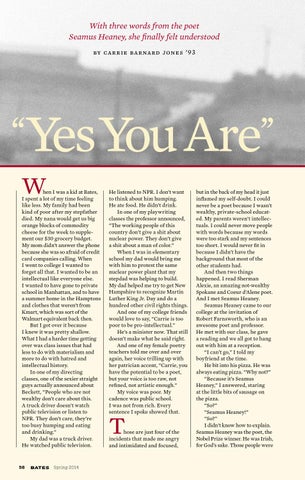With three words from the poet Seamus Heaney, she finally felt understood by carrie barnard jone s ’ 9 3
‘‘Yes You Are’’ W
hen I was a kid at Bates, I spent a lot of my time feeling like less. My family had been kind of poor after my stepfather died. My nana would get us big orange blocks of commodity cheese for the week to supplement our $30 grocery budget. My mom didn’t answer the phone because she was so afraid of credit card companies calling. When I went to college I wanted to forget all that. I wanted to be an intellectual like everyone else. I wanted to have gone to private school in Manhattan, and to have a summer home in the Hamptons and clothes that weren’t from Kmart, which was sort of the Walmart equivalent back then. But I got over it because I knew it was pretty shallow. What I had a harder time getting over was class issues that had less to do with materialism and more to do with hatred and intellectual history. In one of my directing classes, one of the sexier straight guys actually announced about Beckett, “People who are not wealthy don’t care about this. A truck driver doesn’t watch public television or listen to NPR. They don’t care, they’re too busy humping and eating and drinking.” My dad was a truck driver. He watched public television.
56
Spring 2014
He listened to NPR. I don’t want to think about him humping. He ate food. He didn’t drink. In one of my playwriting classes the professor announced, “The working people of this country don’t give a shit about nuclear power. They don’t give a shit about a man of color.” When I was in elementary school my dad would bring me with him to protest the same nuclear power plant that my stepdad was helping to build. My dad helped me try to get New Hampshire to recognize Martin Luther King Jr. Day and do a hundred other civil rights things. And one of my college friends would love to say, “Carrie is too poor to be pro-intellectual.” He’s a minister now. That still doesn’t make what he said right. And one of my female poetry teachers told me over and over again, her voice trilling up with her patrician accent, “Carrie, you have the potential to be a poet, but your voice is too raw, not refined, not artistic enough.” My voice was poor. My cadence was public school. I was not from rich. Every sentence I spoke showed that.
T
hose are just four of the incidents that made me angry and intimidated and focused,
but in the back of my head it just inflamed my self-doubt. I could never be a poet because I wasn’t wealthy, private-school educated. My parents weren’t intellectuals. I could never move people with words because my words were too stark and my sentences too short. I would never fit in because I didn’t have the background that most of the other students had. And then two things happened. I read Sherman Alexie, an amazing not-wealthy Spokane and Coeur d’Alene poet. And I met Seamus Heaney. Seamus Heaney came to our college at the invitation of Robert Farnsworth, who is an awesome poet and professor. He met with our class, he gave a reading and we all got to hang out with him at a reception. “I can’t go,” I told my boyfriend at the time. He bit into his pizza. He was always eating pizza. “Why not?” “Because it’s Seamus Heaney,” I answered, staring at the little bits of sausage on the pizza. “So?” “Seamus Heaney!” “So?” I didn’t know how to explain. Seamus Heaney was the poet, the Nobel Prize winner. He was Irish, for God’s sake. Those people were
